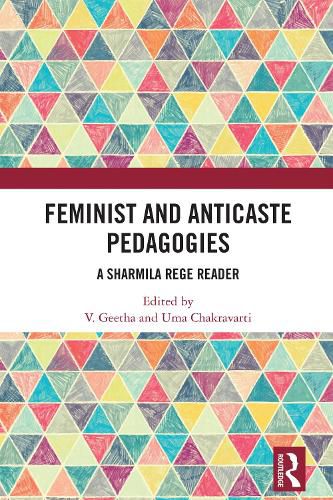Readings Newsletter
Become a Readings Member to make your shopping experience even easier.
Sign in or sign up for free!
You’re not far away from qualifying for FREE standard shipping within Australia
You’ve qualified for FREE standard shipping within Australia
The cart is loading…






This book comprises the collected essays of Sharmila Rege (1964 - 2013), which span a range of themes, including critical perspectives on women's movements, Dalit standpoint feminism, and the relationship between Women's Studies and other disciplines. Written over two decades and more (from the 1990s to 2010), these pioneering essays draw from the struggles and writings of Dalit women, the long history of anticaste thought in Maharashtra and global feminist debates. Equally, they address enduring concerns to do with caste and gender, and call attention to the inseparability of struggles against caste and patriarchy.
Framed and annotated by an introduction that places Sharmila's work in the intellectual and historical contexts that shaped it, the volume also features short prefatory notes by her colleagues on the various themes taken up for discussion. Addressing, as it does, the researcher, the activist and the teacher, the book is indispensable for students and researchers of women's studies, feminism, gender studies, Dalit studies, minority studies, Sociology, as well as studies in language and rhetoric.
$9.00 standard shipping within Australia
FREE standard shipping within Australia for orders over $100.00
Express & International shipping calculated at checkout
This book comprises the collected essays of Sharmila Rege (1964 - 2013), which span a range of themes, including critical perspectives on women's movements, Dalit standpoint feminism, and the relationship between Women's Studies and other disciplines. Written over two decades and more (from the 1990s to 2010), these pioneering essays draw from the struggles and writings of Dalit women, the long history of anticaste thought in Maharashtra and global feminist debates. Equally, they address enduring concerns to do with caste and gender, and call attention to the inseparability of struggles against caste and patriarchy.
Framed and annotated by an introduction that places Sharmila's work in the intellectual and historical contexts that shaped it, the volume also features short prefatory notes by her colleagues on the various themes taken up for discussion. Addressing, as it does, the researcher, the activist and the teacher, the book is indispensable for students and researchers of women's studies, feminism, gender studies, Dalit studies, minority studies, Sociology, as well as studies in language and rhetoric.